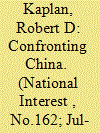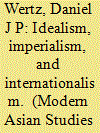| Srl | Item |
| 1 |
ID:
168035


|
|
|
|
|
| Summary/Abstract |
EFORE ONE can outline a grand strategy for the United States, one has to be able to understand the world in which America operates. That may sound simple, but a bane of Washington is the assumption of knowledge where little actually exists. Big ideas and schemes are worthless unless one is aware of the ground-level reality of several continents, and is able to fit them into a pattern, based not on America’s own historical experience, but also on the historical experience of others. Therefore, I seek to approach grand strategy not from the viewpoint of Washington, but of the world; and not as a political scientist or academic, but as a journalist with more than three decades of experience as a reporter around the globe.
|
|
|
|
|
|
|
|
|
|
|
|
|
|
|
|
| 2 |
ID:
118923


|
|
|
|
|
| Publication |
2013.
|
| Summary/Abstract |
While establishing a framework for colonial governance in the Philippines, American policymakers had to confront the issue of opium smoking, which was especially popular among the Philippine Chinese community. In 1903, the Philippine Commission proposed a return to the Spanish-era policy of controlling the opium trade through tax farming, igniting outrage among American Protestant missionaries in the Philippines and their supporters in the United States. Their actions revived a faltering global anti-opium movement, leading to a series of international agreements and domestic restrictions on opium and other drugs. Focusing mostly on American policy in the Philippines, this paper also examines the international ramifications of a changing drug control regime. It seeks to incorporate the debate over opium policy into broader narratives of imperial ideology, international cooperation, and local responses to colonial rule, demonstrating how a variety of actors shaped the new drug-control regimes both in the Philippines and internationally.
|
|
|
|
|
|
|
|
|
|
|
|
|
|
|
|
| 3 |
ID:
179823


|
|
|
|
|
| Summary/Abstract |
The error that American policymakers are most likely to make is abandoning a struggle that the United States has now developed a reasonably efficient approach to waging.
|
|
|
|
|
|
|
|
|
|
|
|
|
|
|
|